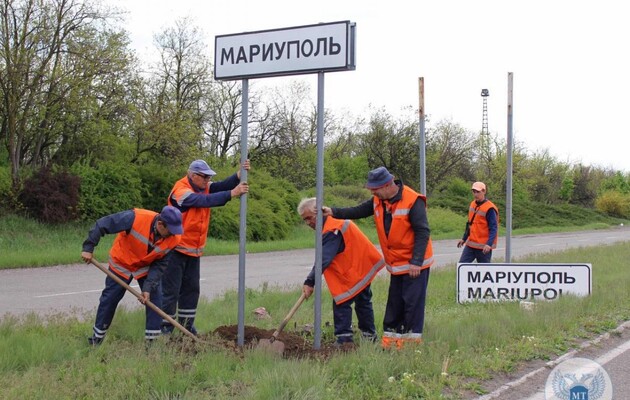At the beginning of full-scale hostilities against Ukraine, the kremlin junta repeated the mantra that they had no intention of establishing an occupation regime in the occupied territories. Behind the veil of outspoken bluffing, the words were hiding a totally pragmatic consideration. Even the limited occupation of someone else’s territory is unjustifiably costly. Furthermore, in terms of logistics management, it is an overly complicated idea.
Efficient and lasting occupation requires a well-established operational system of government and the trained staff of professional administrators (other than local collaborators). In addition, the direct occupation causes a number of unnecessary restrictions and prohibitions for russian federation, under the Hague Convention (1907) and Geneva Conventions (1949).
Putin’s junta planned to avoid this excessive burden by resorting to successfully tested and more organic tactics, in the context of hybrid warfare, such as the invasion intended to escalate the controlled chaos. Putin's military aggression was to bring Ukraine back to instability, with its further normalization on terms and conditions of the russian federation. The occupation scenario per se started to be designed in kremlin when it became apparent that the initial plan of the “special military operation” was collapsing in action.
However, does Ukraine have a counter-scenario of maintaining manageability and functioning of cities? Has a clear line been drawn between helping the city survive before the arrival of Ukrainian Army and collaborationism? Why should all this be necessary if we plan to de-occupy our territories? With our people.
russia's failure at the start of the occupation
The absorption of the Ukrainian system of local self-government was seen as the primary task of the russian federation during the transition to a strategy of prolonged occupation. Therefore, Ukrainian local self-government bodies were the first to face the blow of temporary occupation. The savage murders of local government officials and deputies were to convince all dissenting or neutral officials of no other option than cooperation with the “liberators.” Abduction of local councilors and municipal employees became a form of pressure and intimidation. Since the invasion, 53 local government officials have been abducted (23 of them are heads of communities). To date, the Ukrainian authorities have managed to liberate most of the mayorsbut three of them are still illegally detained by the russian troops.
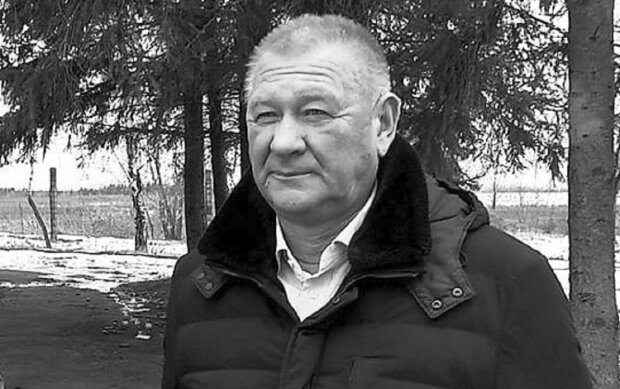
Head of the community of Hostomel (Kyiv region), Yurii Prylipko. Killed by the occupiers on March, 7, 2022, when he was distributing bread and medicines to the residents of the community. Hostomel newspaper
Dreams of absorption were shattered by the position of local councilors and mayors who vehemently denied the ideas of cooperation with the enemy. The second fall came from the misunderstanding of the impact of decentralization reform, even by local collaborators. Unlike in russia, Ukraine does not have any leverage of centralized influence on local self-government bodies on the primary level. The budgetary and political dependence of hromadas on oblast and rayon administrations has vanished into a thin air. That is why one cannot attempt at swallowing all hromadas at one go without a choking hazard.
Next, the Rashists decided to go for dismissing local self-government and replacing it with so-called military and civil administrations or fake "mayors". However, without further ado, the occupation structures showed their total inability to at least somehow control the situation and sustain the life of the communities, even at the minimum acceptable level.
By advertising humanitarian aid from the “United Russia” the gauleiters try to compensate for their failure to establish basic social security and the provision of public services. Instead of restoring the public transport system, they develop schemes to remove trolleybuses as spoils of war (for example, in Mariupol). The “re-booting” of the health care system, according to russian standards, is implemented through theft of costly medical equipment. Certainly, against this background, the water supply to the Kherson city fountain is presented by the Rashists as the highest manifestation of care and managerial skill. That is why the russians did not dare to go for total liquidation of local self-government, although Ukrainian flags were taken down from everywhere.
Impelled Stake on Local Authorities
The approach of the occupiers to work with local self-government has changed again when it turned out that neither complete absorption nor dismissal brought the wanted effect. Local representatives of the kremlin have put forward a new condition to the heads of communities: you can work under Ukrainian laws and we will not touch you if you provide for the life of the community (waste disposal, provision of utility services, provision of urban amenities).
This option can’t be labelled as the worst of all listed solutions. After all, municipal workers can avoid formal cooperation with the enemy but fulfill their key mission — to take care of Ukrainian settlements and work for Ukrainian citizens who stay under temporary occupation. Thus, through their actions, they indirectly help high-level collaborators to create the "right" propaganda image about "normalization of life" in the captured territories. However, it is clear that this is the ruminated information forage designed exclusively for the domestic russian audience. As the Executive Director of the Association of Cities of Ukraine,Oleksandr Slobozhan, rightfully said in one of the conversations: "Let them enjoy their PR, our citizens see and know very well who makes the city continue."
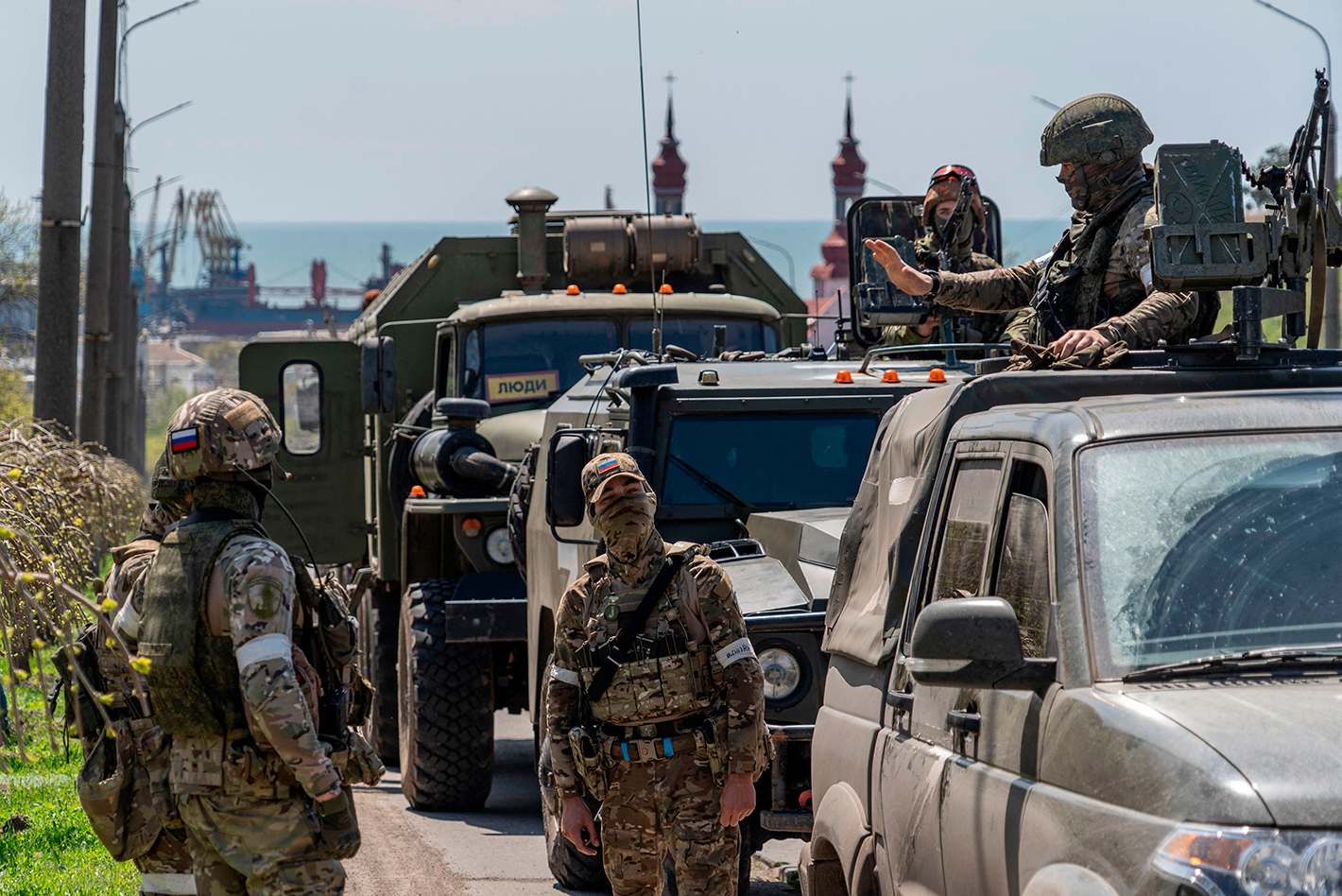
Russian military on the Street in Berdiansk, April, 30, 2022. Getty Images
In addition to the usual functions that municipal employees perform in the temporarily occupied territories (ensuring the work of utility companies, educational institutions, current repairs of infrastructure), they take record of destruction, crimes,and damage caused by the occupiers. It is the presence of Ukrainian local self-government that allows to regularly contribute to the evidence base, which will build the basis for future reparations, compensations,and court verdicts.
The least restriction on the activity of Ukrainian public authorities in the temporarily occupied territories will hit Ukrainian citizens the hardest, not the occupiers or their supporters. To provide an example, it happened when some Ukrainian institutions forcibly ceased their operations, such as the management of the Pension Fund, social protection service, most banks closed down, the treasury was transferred to remote mode of functioning.
Due to the threat of repression, the vast majority of mayors of cities and villages in the territories seized by the Rashists were evacuated to safer places, and continue to work remotely. The Ukrainian governance and service delivery structures that remain under occupation continue to operate, pay taxes in Ukraine and receive budget funding, except for those institutions where the leaders have explicitly expressed support for the occupation authorities.
Problems to be Tackled Every Day
As in peacetime, although not so disciplined, citizens continue to pay their utility bills. However, the treasury has been unable to deliver electronic payments for two months, and utility companies do not have access to these funds. The situation is critical because utilities operate mainly at the expense of payments from service users, as well as their own savings. At the same time, the occupation administrations are trying to pull the trick of lowering municipal tariffs to force residents to pay to collaborators, not to legitimate providers.
The main problem is the circulation of cash, which is catastrophically lacking. Salaries and pensions received on card accounts can not be withdrawn; people cannot use them for card payments. Sometimes Ukrposhta accomplished the unbelievable miracles — they managed to deliver cash to their local branches in the occupied territories. Due to the blocking of communication and the Internet, terminals in retail chains do not work at all,or work with interruptions. The cash-out service is flourishing: for 7–10% of the margin, you can get cash (hryvnia) by pre-transferring the amount to the proposed card. Residents continue to avoid using rubles in every possible way.
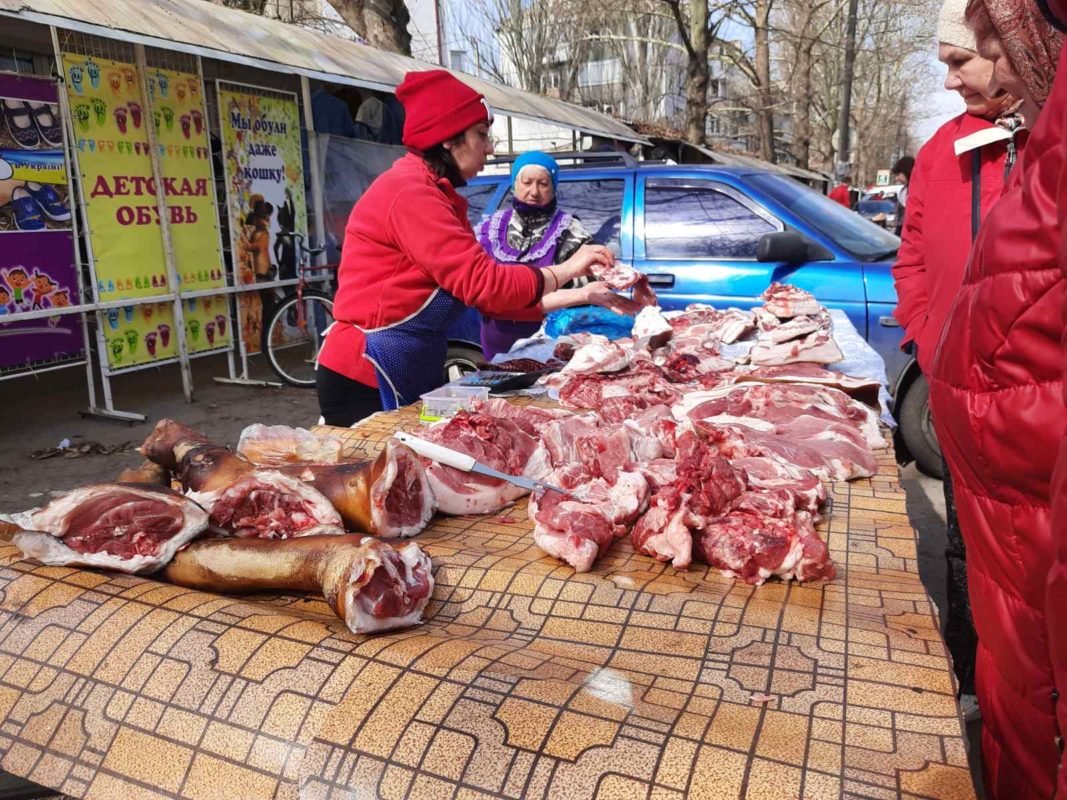
Kherson, spring, 2022. Bazaar. Windows
In their all-out effort, the occupiers are trying to take control of financial flows and tax settlements. The highest pressure is put on the heads of utility companies — they are forced to re-register with fake “tax authorities” and open accounts in rubles. So far, this effort has been unsuccessful but, as the leaders themselves admit, it will be impossible to resist plundering and blackmail very soon. In this situation, time certainly goes against Ukraine’s interests. It enables occupiers to implement the creeping seizure of the real power in the communities.
The entrepreneurs who have been offered the official patronage by putin's self-proclaimed proxies will suffer the same bullying. Currently, spontaneous trade is developing in the temporarily occupied territories, caused by the shortage of goods and food, and the collapse of logistics links. Bazaars remain the only place that could still offer some jobs and prospects for additional earnings. The nouveaux profiteers are required to register a fake sole trader status, former businessmen are also forced to "re-register" their business and stop paying taxes to Ukraine.
Until July, 7, Ukrainian sole traders and enterprises must register with the tax service of the occupiers and open accounts in rubles. Those who cannot be intimidated are bribed with benefits and reduced tax rates. People dodge expropriations and tax experiments in every way they can. To inspire hope and optimism in the souls of the inhabitants of the occupied territories, the gauleiter Balytskyi suggested that they should not deliver on their credit obligations to financial institutions. The main rule is that there are no rules. And here Ukraine should count on the consciousness of its citizens. And therefore — to continue to support them in any way possible.
The long-awaited assistance and law from the state
Local officials emphasize that they will work in their positions and provide services to residents for as long as the situation in the occupied territories allows. As long as they still receive proper funding from the Ukrainian budget. “Our main task is to preserve the efficiency of the system, for as long as it is possible,” — said the mayor of Skadovsk, Oleksandr Yakovlev. That is why, the pressure of the occupiers is not as critical as Ukraine's ability to fully meet its obligations to budget-supported employees in the temporarily occupied territories.
It is equally important for the Ukrainian authorities toclearly outline to the employees of municipal institutions the permissible limits of the exercise of their powers in the context of temporary occupation.
Currently, the following scheme is operational: heads of enterprises and institutions suspected of collaborating with the aggressor through an open demonstration of support shall be immediately dismissed, and public funding is frozen or diverted through other institutions,to retain the staff.
In addition to explicit collaboration, the red line for the management of municipal institutions is the decision to open a bank account in rubles and register with the so-called tax authorities created by the occupation administrations. For ordinary workers, the permissible limit is not so obvious. Whether they continue to work if they start paying their salaries in rubles, they do not know.
Meanwhile, they know perfectly well that there is a law on collaborators, and on direct risks to end up in this category. It is an unbearable psychological burden for many. On the other hand, the Ukrainian state should make life as easy as possible for people who are experiencing the occupation. But how?
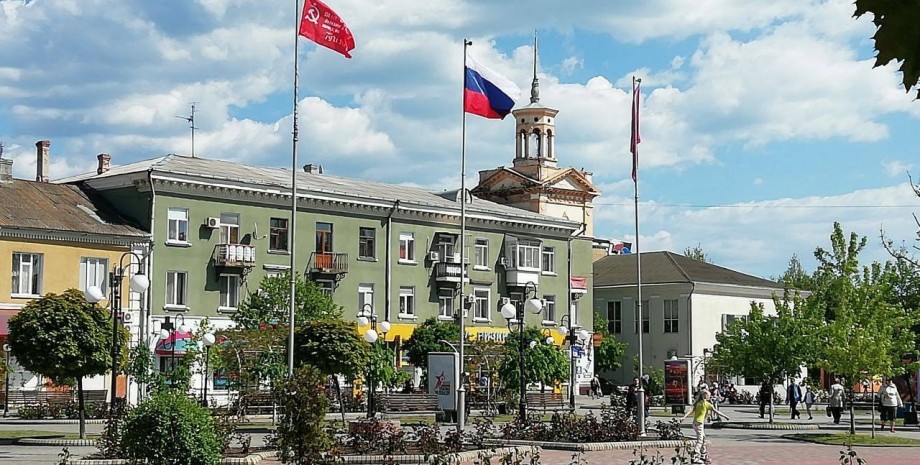
Berdiansk. Occupied summer of 2022. focus
By legislating criminal liability for collaborative activities, the state defined a list of strict prohibitions, but did not outline the limits of permitted and desired behaviors. Most questions arise in this regard, especially for those who wish to preserve their dignity and stay law-abiding under the occupation. It is more or less clear to everyone how not to turn into a ardent collaborator. Because there are clear legal provisions and the hackneyed role models such as Saldo or Balitsky. But hardly anyone knows what image of a good citizen under occupation is acceptable for the government. Other than the underground resistance fighter role. The main question of an ordinary civil servant or a state employee is how to not inadvertently stumble and do the right thing when you work, being in fact in the status of a hostage of Rashists. It is extremely useful that state officials share their thoughts on clear signs of collaboration, but people are waiting for formal instructions and clarifications from the government. Not just for comments to the media.
Personal Ways of Retaining Citizenship
Employees of Ukrainian budgetary institutions are pressured not only by strengthening control over the exercise of their powers but also by coercion to publicly demonstrate loyalty to the illegal regime. For example, it includes the involvement in various kinds of public events organized by the occupation administrations. Most of them have so far avoided direct self-defamation.
During the occupation celebrations and pseudo-patriotic orgies, cultural and educational workers go on official leaves to avoid compromising themselves. Instead, school principals in Kherson and Zaporizhia oblasts, having a much narrower space for maneuver, receiving criminal orders, massively withdraw from their official positions.
However, it is not dismissal but rather sabotage remains the main weapon of Ukrainian officials and budget employees under temporary occupation. Rasists’ proxyStremousov is has a fit of hysterics because in the villages of Kherson oblast "officials sabotage the work on the ground and do not convey to the population the position about the future of the region within the russian federation.” In his video messages, he threatens to remove such employees from work.
It is difficult to overestimate the courage of officials who continue to remain in their jobs under blockade. Such actions have an unforged symbolic effect and are a manifestation of solidarity with those who remained. However, it should be understood that in the occupation, Ukrainian officials are extremely constrained in the exercise of their legitimate powers. At the same time, they are running a constant risk of being “denazified”.
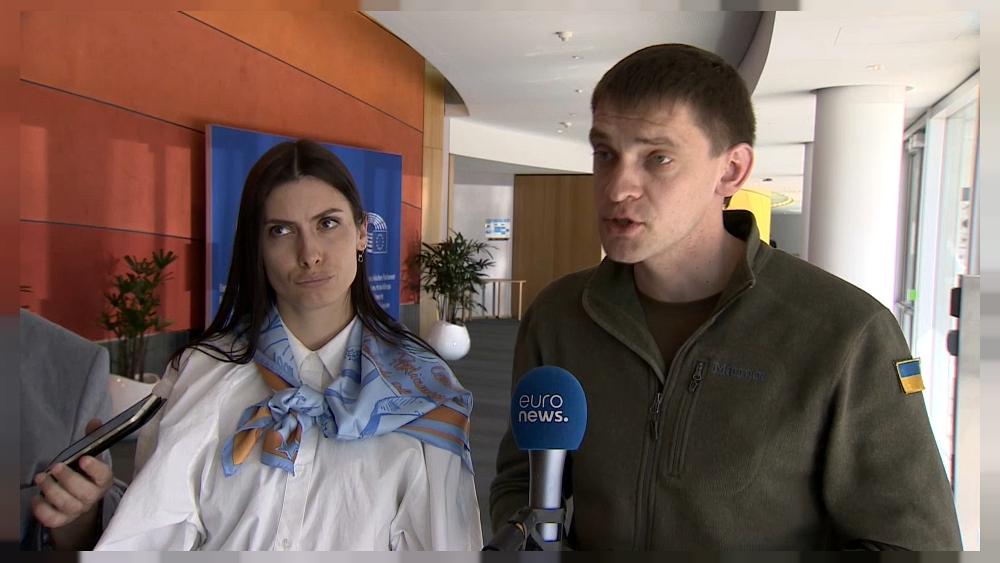
Melitopol Mayor Ivan Fedorov. He was kidnapped by the occupiers and later exchanged for russian soldiers. Youtube Screenshot
Timely decisions to evacuate local government officials from the temporarily occupied territories protect them from abduction and detainment. For those who represent the legitimate authorities and are able to support the life of communities remotely, saving their own lives should be prioritized. Staying or leaving for MPs or local heads is not a matter of personal choicesbut rather a token of responsibility to the community. It should be taken into account that local officials and servants are carriers of sensitive information valuable to the enemy. Therefore, guaranteeing their security is the duty of the government, and not just a matter of individual preferences.
Today, local self-government is the last surviving bridge that links free Ukraine with free people in the temporarily occupied territories. In case of complete blocking of the activities of municipal institutions, the state will always have time to make a decision on the introduction of a military administration and the actual termination of the powers of local self-government bodies. This has been the recent solution for Genichesk, and earlier — for other communities. However, it is important to keep this bridge on as long as possible. In any case, the complete de-occupation of the liberated territories will begin with the restoration of local self-government.
